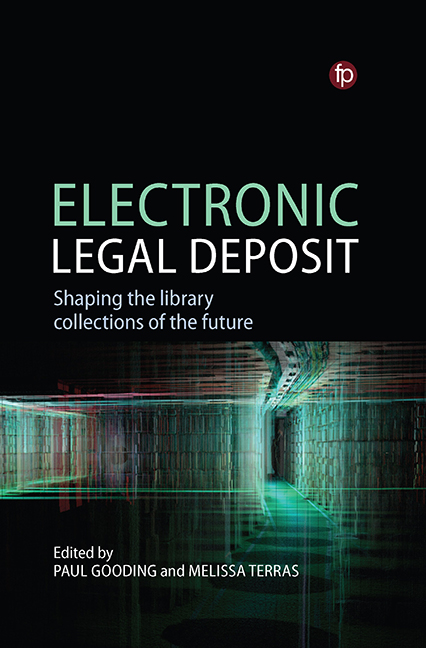Book contents
- Frontmatter
- Dedication
- Contents
- Figures and Tables
- Contributors
- Foreword
- Introduction
- PART 1 INSTITUTIONS AND IMPLEMENTATION
- 1 UK Non-Print Legal Deposit: From Regulations to Review
- 2 The Influence of Legal Deposit Legislation on the Digital Collections of the National Library Of Scotland
- 3 E-legal Deposit at the Biblioteca Nacional de México (National Library of Mexico)
- 4 Bibliographic Control in Zimbabwe: the Conundrum of Legal Deposit in the age of Digital Technologies
- 5 Electronic Legal Deposit in Sweden: the Evolution of Digital Publications and Legislative Systems
- PART 2 USERS AND CONTEXTS
- 6 Publishers, Legal Deposit and the Changing Publishing Environment
- 7 Making History: Digital Preservation and Electronic Legal Deposit in the Second Quarter of the 21st Century
- 8 Giving with one Click, Taking with the Other: Electronic Legal Deposit, Web Archives and Researcher Access
- 9 Follow the Users: Assessing UK non-print Legal Deposit within the Academic Discovery Environment
- 10 ‘An Ark to Save Learning from Deluge’? Reconceptualising Legal Deposit After the Digital Turn
- Index
1 - UK Non-Print Legal Deposit: From Regulations to Review
Published online by Cambridge University Press: 07 November 2020
- Frontmatter
- Dedication
- Contents
- Figures and Tables
- Contributors
- Foreword
- Introduction
- PART 1 INSTITUTIONS AND IMPLEMENTATION
- 1 UK Non-Print Legal Deposit: From Regulations to Review
- 2 The Influence of Legal Deposit Legislation on the Digital Collections of the National Library Of Scotland
- 3 E-legal Deposit at the Biblioteca Nacional de México (National Library of Mexico)
- 4 Bibliographic Control in Zimbabwe: the Conundrum of Legal Deposit in the age of Digital Technologies
- 5 Electronic Legal Deposit in Sweden: the Evolution of Digital Publications and Legislative Systems
- PART 2 USERS AND CONTEXTS
- 6 Publishers, Legal Deposit and the Changing Publishing Environment
- 7 Making History: Digital Preservation and Electronic Legal Deposit in the Second Quarter of the 21st Century
- 8 Giving with one Click, Taking with the Other: Electronic Legal Deposit, Web Archives and Researcher Access
- 9 Follow the Users: Assessing UK non-print Legal Deposit within the Academic Discovery Environment
- 10 ‘An Ark to Save Learning from Deluge’? Reconceptualising Legal Deposit After the Digital Turn
- Index
Summary
Legal deposit is the statutory requirement for any publisher to deposit a copy of their publications with designated libraries. It plays a critical role in ensuring preservation of the nation's cultural heritage by allowing systematic collection of the published output. It is the record of human memory, creativity and discovery collected and preserved for future generations. In this chapter, we will detail the development of legal deposit in the UK, focusing on the rapid changes that have taken place during the last 20 years, leading to the implementation of UK Non-Print Legal Deposit (NPLD) in 2013. We explore the difficulties encountered when undertaking a digital infrastructure project of this magnitude, along with the unexpected benefits derived from the transition from print to digital. The chapter concludes with the findings and recommendations of the Post-implementation Review, a mandatory review of whether the UK NPLD regulations are fit for purpose and achieve their intended objective: to preserve our nation's cultural heritage, whether digital or print.
UK legal deposit today
Legal deposit legislation in the UK has evolved over the centuries since it was introduced into the statutes for England and Wales in 1662 (Licensing of the Press Act 1662) and for the whole UK in 1710 (The Copyright Act, 1710). The origin of this privileged status dates back even further than the legislation, to 1610, when Sir Thomas Bodley obtained the agreement of the Stationers’ Company to permit the Bodleian Library to claim a copy of everything printed by its members under royal licence (Bodleian Libraries, 2017); in effect making it the first legal deposit library in the British Isles.
The first Copyright Act of 1710 extended this privilege to the Royal Library (later to become the British Library), the library of the University of Cambridge, the Library of Sion College in London and the library of the Faculty of Advocates in Edinburgh (to become the home of the National Library of Scotland), and the ancient universities in Scotland. Over the years other libraries were added or removed. Trinity College Dublin was included in 18011, at a time when Ireland was part of the United Kingdom of Great Britain and Ireland and governed by the UK parliament.
- Type
- Chapter
- Information
- Electronic Legal DepositShaping the Library Collections of the Future, pp. 3 - 32Publisher: FacetPrint publication year: 2019
- 2
- Cited by



